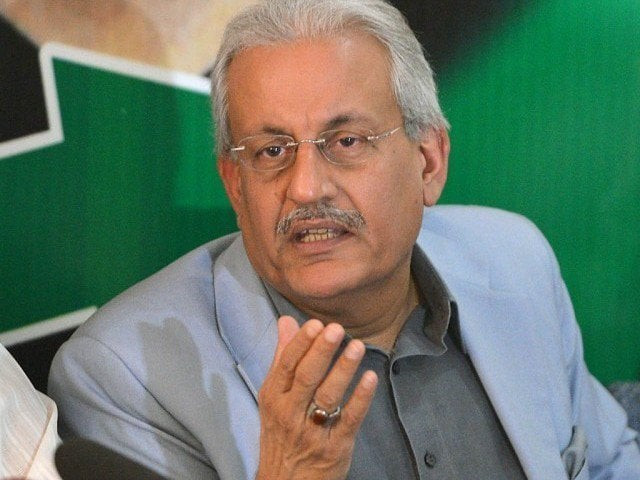Revival of military courts unfortunate, says Rabbani
Senate chairman regrets had PML-N govt delivered on its promises revival would not have been needed

Rabbani calls an agreement on the re-establishment of military courts as unfortunate. PHOTO: AFP/FILE
During the Senate session on Friday, Rabbani said he had voted with a heavy heart in favour of the 21st Constitutional Amendment Bill for the setting up of military courts in January 2015 and now as chairman of the Senate felt despondent on the development.
Govt mulls reinstatement of military courts
“Now again it is being said that a parliamentary supervisory committee will be constituted. I remind you all the same had been said two years ago. Had appropriate steps been taken, we would not have seen this day,” Rabbani said.
Cognisant of the inexorable danger due to the government’s inaction on civilian side’s reforms, he said the Senate committee on January 18, 2016 passed two landmark legislations - Witnesses Protection Bill 2016 and Anti-Terrorism Amendment Bill 2016 - in the hope that they would serve as catalysts for the government to adopt appropriate legislative measures to improve judicial system so that the civilian courts could try hardcore terrorists.
“We passed these laws well ahead of the expiry of the sunset clause inserted in the 21st Constitutional Amendment Bill. Had the government bothered to take these as working papers, we could have been saved,” he resonated amid pin-drop silence in the house.
Finance Minister Ishaq Dar responded to him saying, “We all share your sentiments. It was the wish of every political party … but it is being done due to peculiar circumstances.”
Military courts to get permanent status
“Now again it is being said that a parliamentary supervisory committee will be constituted. I remind you all that the same promises were made two years back. Had appropriate steps were taken, we would not have to see this day again” said Rabbani, who has consistently voiced concern with military intervention in the civilian domain.
Rabbani’s had said, “I have been in the Senate for more than 12 years but have never been as ashamed as I am today, and I cast my vote against my conscience,” when voting for the military courts.
Cognisant of the inexorable dangers presented by the government’s inaction on improving the civilian criminal system, he said that on January 18, 2016, a senate committee passed two landmark pieces of legislation, the Witnesses Protection Bill 2016 and the Anti-Terrorism Amendment Bill 2016, hoping they would serve as catalysts for the government to adopt appropriate legislative measures for reforms in the country’s judicial system so that the civilian courts could try hardcore terrorists.
Military courts not a lasting solution: Shah
He was referring to the sudden spike in terrorist incidents last month, soon after the military courts ceased to function from January 7, 2016.
He promised the government would this time take measures so that the new extension of military courts serves as its last.
Dar was to hand over amended draft of the proposed 28th Constitutional Amendment Bill and subsequent changes in the draft bill on Pakistan Army Act, 1952 to the Leader of the Opposition in Senate Aitzaz Ahsan on Friday.
Both amended bills would be presented in the National Assembly (NA) on Monday. It is likely that there will be a brief discussion on these legislations and would be put for a vote the same day. Once adopted by the NA, these bills will be sent to the Senate for approval.
The 28th Constitutional Amendment Bill requires approval vote from two-thirds members of both the houses of parliament separately while amendments in Pakistan Army Act, 1952, needs a simple majority vote. PPP dominates the Senate being the single largest party having 28 members in the 104-member house.
Minister for Law Zahid Hamid in his brief remarks said, both the bills the chair had referred to were under consideration of the incumbent government.
Govt unlikely to consider PPP’s proposals on military courts
It is expected that there would be a brief discussion on these legislations in the NA and they would be up for a vote on the same day. Once adopted by the assembly, these bills would be sent to the senate for approval.
The 28th amendment bill requires two-thirds approval in both houses of the parliament, while amendments to the Pakistan Army Act only require a straight majority.
The PPP is the single largest party in the Senate, with 28 members in the 104-member house. It also controls the offices of the chairman and leader of the opposition in the upper house.
Law Minister Zahid Hamid said that both the bills the chair had referred to were under consideration.
Fate of military courts hangs in balance
The leader of the opposition in the Senate vowed his party has once again decided to support the military courts, but with certain reservations. According to him, he still doubts the PML-N government would fulfil its promises, but his party became part of the process due to sensitivities involved in the country’s war against terror.
He said military courts were one matter in the 20-point National Action Plan chalked out after December 2014 terrorist attack on Army Public School in Peshawar. “We hope the rest of the 19 points will be implemented before the expiry of the two-year term,” he added.
Census issues
Senator Sherry Rehman voiced alarm over a number of controversies arising from unresolved issues related to the census which is currently underway.
“The government has failed to address the most fundamental issues of transparency and verification of numbers, leading many to question the intention and validity of the long-awaited exercise. The questionable use of forms that exclude carbon copies or any form of cross verification by enumerators is a huge exclusion, and will create more questions than answers as to the whole point of the census,” said the senator.
She stated, “It is alarming that no counterfoils are given to the house members after the enumeration, which means the household will have no evidence of any details they have provided the enumerator. It is also questionable why the government is not disclosing how many people are included in a bloc.”
The government is currently facing gaping questions on rules and practices regarding the collection of data pertaining to overseas Pakistanis, disabled people and women. “The exclusion of Form 2A is a problem considering how this will result in the significant data and social indicators being left out,” the senator pointed out.
Some treasury members including Lt Gen (retd) Abdul Qayum supported the idea of appointing one of the ministers as a focal person to address the issues arising during the ongoing national headcount exercise. Leader of the House Raja Zafar ul Haq told the house that he had already written a letter to the prime minister in this regard and soon a minister will be nominated.
Responding to Rehman’s calling attention notice, the law minister told the Senate that the government has decided to postpone the headcount in Federally Administered Tribal Areas (Fata) bordering Afghanistan for the second phase. Some districts of Fata were earlier kept in the first phase of the census, which started on March 15. He said the government has also taken notice of complaints that some enumerators were using led pencils to fill the data forms.
According to him, the issue of carbon copies of data forms cannot be addressed since these forms have been printed on special paper with a bar code.
The PPP demanded that the proposed Riwaj Act and the regulation to set up local bodies in the tribal areas in the recently announced reforms package be placed in parliament for discussion before the president signed any regulation in this regard.
Speaking on an issue of public importance in the Senate, Senator Farhatullah Babar said that keeping the Riwaj Act and local bodies law secret from the public and the parliament raised serious questions about the law replacing the notorious Frontier Crimes Regulations in tribal areas as promised in the reforms package.



















COMMENTS
Comments are moderated and generally will be posted if they are on-topic and not abusive.
For more information, please see our Comments FAQ